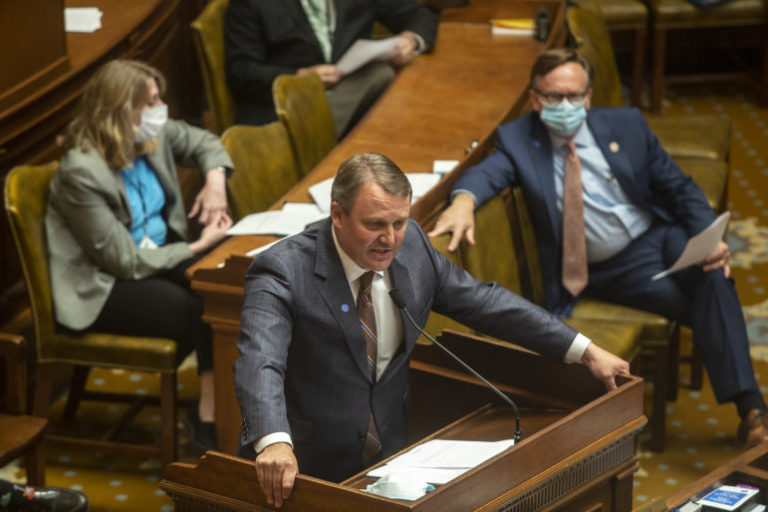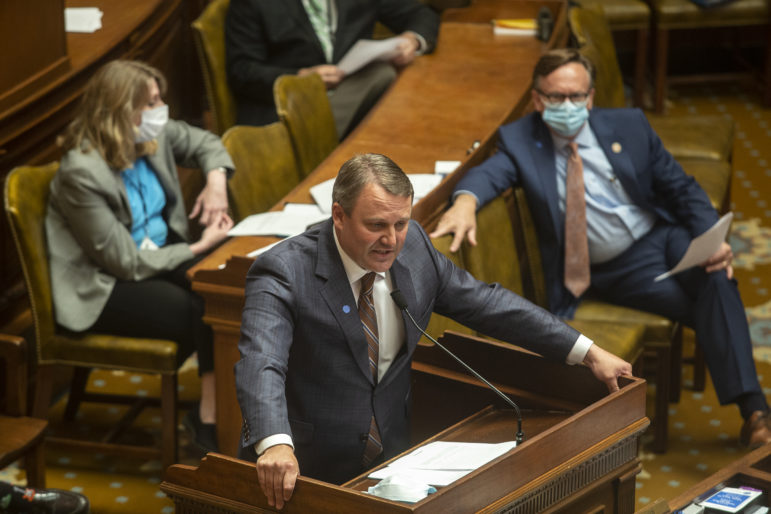

Eric J. Shelton/Mississippi Today
Rep. Jason White speaks about legislation that would remove Gov. Tate Reeves’ spending authority over federal coronavirus stimulus money.
One day last week during a committee meeting he was chairing, Rep. Larry Byrd, R-Petal, looked over his shoulder to see the imposing figure of House Speaker Philip Gunn, R-Clinton.
“I had a stroke,” said Byrd, the non-assuming chair of the County Affairs Committee who was not expecting the House speaker to attend the meeting.
Gunn, still catching his breath after running up four flights of Capitol stairs after attending another meeting, pulled off his mask and gave the charge he was delivering to the multiple House committees meeting throughout the building. That charge was to look for ways to efficiently and quickly distribute $1.25 billion in federal funds to help people and entities impacted by the COVID-19 pandemic.
Legislative leaders had been fighting with Gov. Tate Reeves over who would have spending authority of the federal funds. Reeves had said legislators, stuck in a cumbersome process involving 174 members, would not be able to efficiently appropriate the funds in a timely manner to those in need.
Last week legislators worked to create and pass a program to provide $300 million in grants and funds to small businesses impacted by the coronavirus. While it took a better part of a week before the small business package was passed Wednesday after 11 p.m., it still was quite a legislative feat to create and pass a brand new program in a relatively short period of time considering the speed at which the legislative process normally operates.
Last week it was not unusual to see both presiding officers – Lt. Gov. Delbert Hosemann and Gunn – in committee meetings. It has not been unusual for Hosemann, in his first year as lieutenant governor, to attend committee meetings, but seldom if ever does the speaker participate in committee meetings – at least not before the task of legislators doling out that $1.25 billion in federal funds began.
After working together to prevent Reeves from single-handedly appropriating the funds, it would be reasonable to assume that the two presiding officers felt a bit of pressure and motivation to show they could deliver those funds in an efficient manner.
“We were motivated by the needs of the people of Mississippi and not anything else,” Hosemann contended when asked if he felt any pressure, especially since the fight over who would appropriate the funds was contentious at times.
Soon after it became apparent that the state would receive those funds – before Reeves proclaimed his sole authority to appropriate them – Hosemann said the legislative leaders began talking about where the money could do the most good.
“We recognized the urgency here was for small businesses,” said Gunn, calling them the backbone of the state’s economy.
House Ways and Means Chair Trey Lamar, R-Senatobia, who was one of the key negotiators on the small business program, perhaps provided more insight.
“I don’t know about pressure…about the best way to motivate me, I am just speaking for myself…, is to tell me I can’t do it,” he said on Mississippi Today’s “The Other Side” podcast.
“When the governor made those statements that the Legislature is incapable of spending, appropriating these funds in an efficient manner where we could do some good and get the funds to the people who need them quickly, then I kind of made that a personal mission of mine to help ensure that happened. I don’t think I am alone in that regard. Through the leadership with the speaker and the lieutenant governor… we sat down and man, we went to work, and I think the byproduct is something we can all be proud of.”
Whether the Legislature was actually successful in developing the program, of course, will be borne out in the coming days and weeks.
While Reeves has praised the small business legislation, as of Monday afternoon he had not signed it into law yet. And it is not clear yet when funds will be available from the program, though, there has been speculation that once the bill becomes law $2,000 checks to small businesses forced to close by the coronavirus could be sent out in the next two weeks by the Department of Revenue.
In reality, though, the effort to efficiently spend the funds is just beginning for legislators. They have more than $900 million remaining in the fund to deal with coronavirus-related costs. The states have until the end of the year to spend the funds they received through the Coronavirus Aid, Relief and Security Act or the money will revert to the federal government.
Legislators have talked of the need to spend the funds to help hard hit cities and counties with their costs. They also want to improve distance learning opportunities, but legislators are learning that $1 billion will not solve all the Mississippi’s rural broadband issues.
Hospitals, which have struggled to deal with the costs of the pandemic and the fact other medical procedures have been put on hold to deal with the coronavirus, thus costing them needed revenue, also have been singled out for possible help.
Reeves has said he believes some of the funds should be set aside for work force training opportunities for many of the about 50,0000 Mississippians who have lost their jobs during the economic slowdown. Related to that, he also has said some of the funds should be used to help rebuild reserves in the state’s unemployment trust fund.
Sen. Angela Turner-Ford, D-West Point, chair of the Legislative Black Caucus, said a large portion of the funds – about $450 million – should be used in areas related to the black community since Africans Americans have been disproportionately impacted.
The Black Caucus has proposed programs at the state’s predominately African American colleges and universities, programs to improve health outcomes in the black communities, additional pay for workers put in jeopardy through their jobs during the pandemic and other programs.
“The corona pandemic has highlighted many of the public health, socio-economic and education disparities that have long been impacting the African American community,” Turner-Ford said in a commentary sent out to the state’s media.
“The Mississippi Legislative Black Caucus calls upon the Mississippi Legislature to make conscious and deliberate efforts to address known barriers to opportunities and progress in the African American community.”
In the coming days debate will continue on spending the funds.
And perhaps the pressure on the Legislature and its leadership will grow.
The post Legislature quickly passes small business program even after Gov. Tate Reeves said they couldn’t appeared first on Mississippi Today.
- State fire marshal is investigating troubled Unit 29 at Parchman prison - February 26, 2026
- Mississippi’s Winter Storm Fern losses exceed $107 million, state insurance department says - February 26, 2026
- DNA evidence linked to a Greenville homicide is missing. Now the finger-pointing begins - February 26, 2026